Business Law Assignment: Contract, Torts, and Remedies Analysis
VerifiedAdded on 2021/06/18
|18
|3451
|26
Homework Assignment
AI Summary
This business law assignment explores several key legal issues. The first part analyzes contract formation, focusing on offer and acceptance, and the application of the postal rule in a scenario between Susan and Terry. The second part addresses negligence, examining the duty of care and contributory negligence in the context of financial advice provided by Terry to Kevin. The assignment then delves into misrepresentation in contracts, particularly fraudulent misrepresentation, in a case involving Renzo and Florence Nightingale. It also discusses breach of contract, specifically concerning contract terms (conditions and warranties) and the remedies available to Florence. Finally, it outlines the remedies Florence can seek in the described situation. The analysis includes relevant case law to support the legal arguments.

Running head: BUSINESS LAWS
Business Laws
Name of the student
Name of the university
Author note
Business Laws
Name of the student
Name of the university
Author note
Paraphrase This Document
Need a fresh take? Get an instant paraphrase of this document with our AI Paraphraser
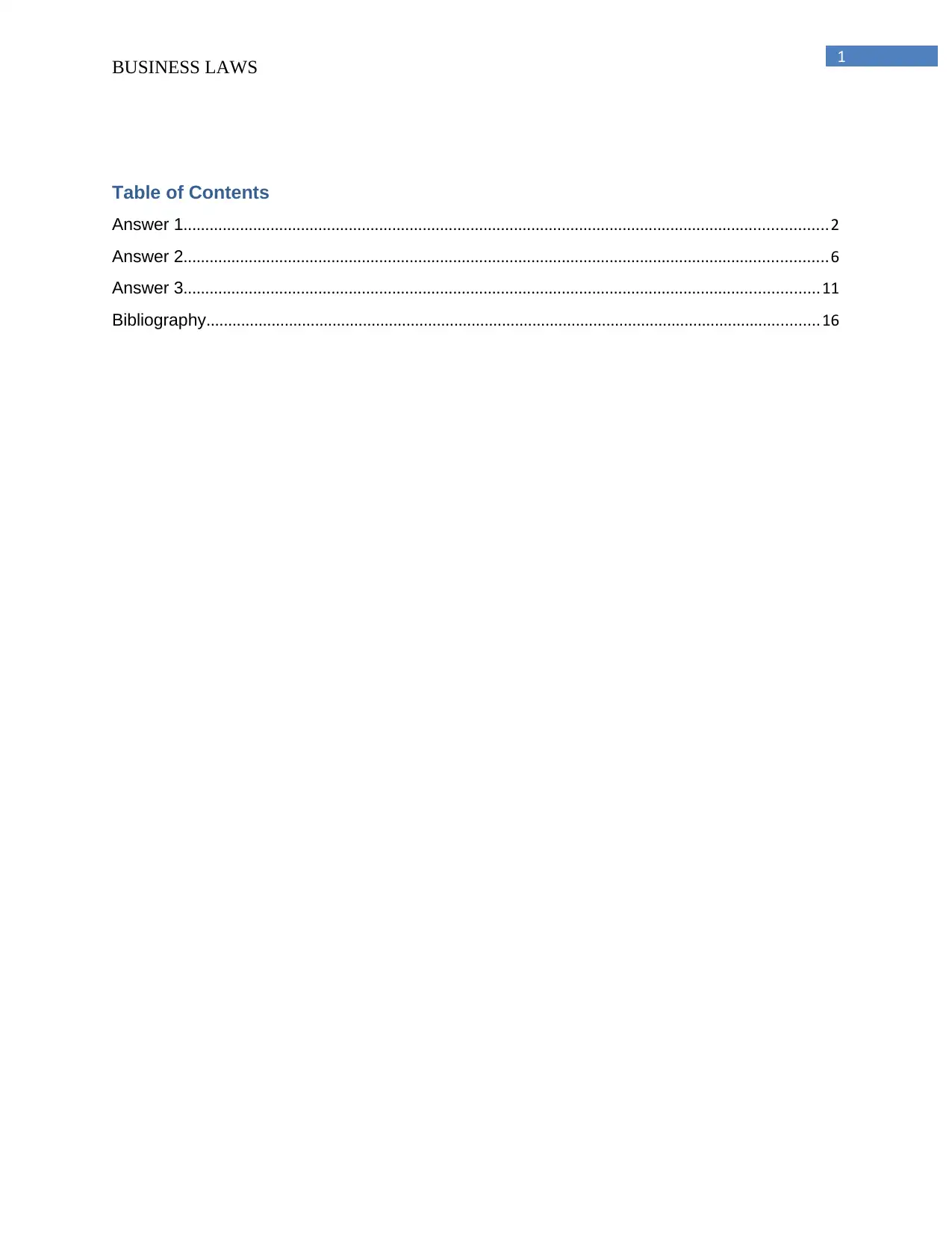
1
BUSINESS LAWS
Table of Contents
Answer 1....................................................................................................................................................2
Answer 2....................................................................................................................................................6
Answer 3..................................................................................................................................................11
Bibliography.............................................................................................................................................16
BUSINESS LAWS
Table of Contents
Answer 1....................................................................................................................................................2
Answer 2....................................................................................................................................................6
Answer 3..................................................................................................................................................11
Bibliography.............................................................................................................................................16
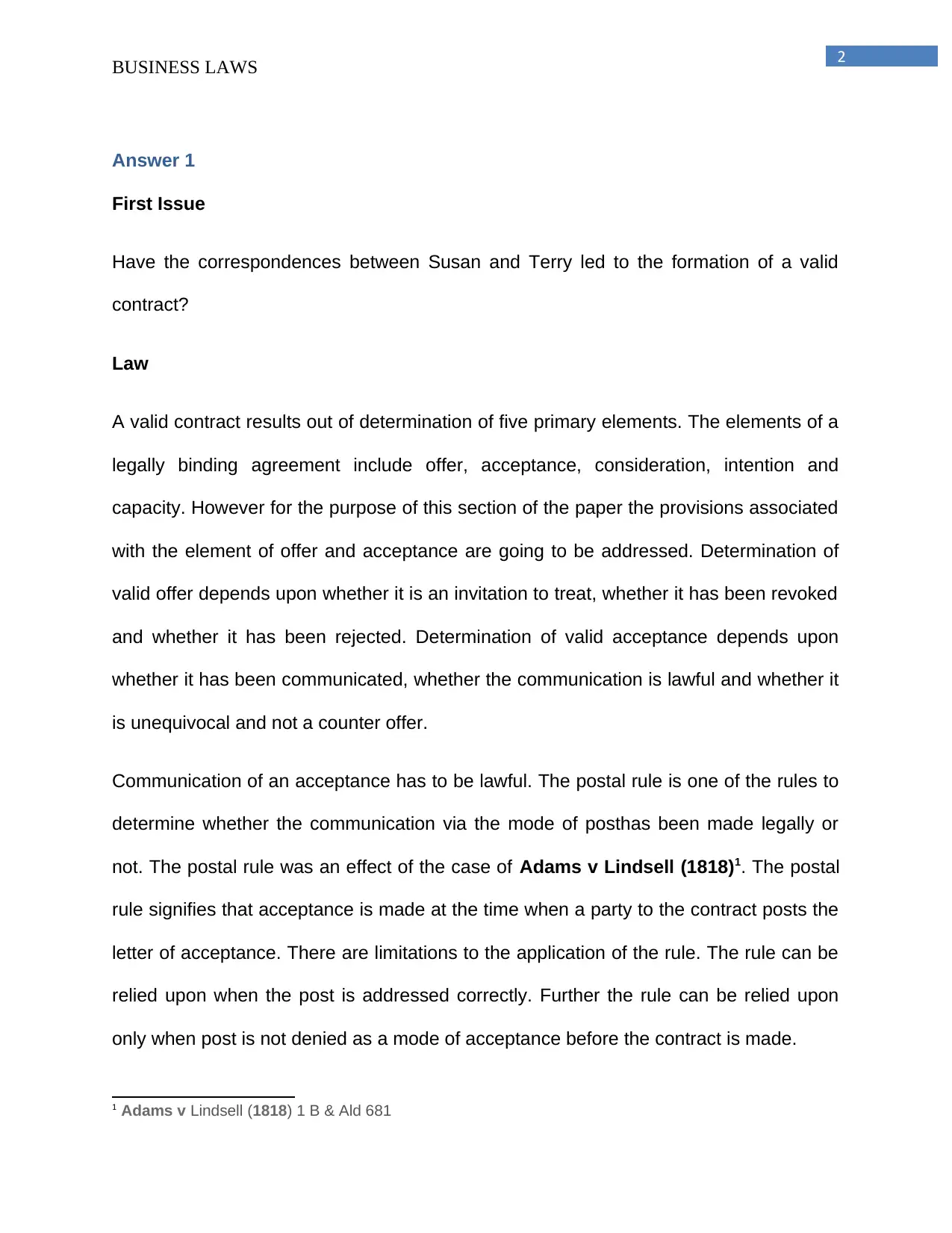
2
BUSINESS LAWS
Answer 1
First Issue
Have the correspondences between Susan and Terry led to the formation of a valid
contract?
Law
A valid contract results out of determination of five primary elements. The elements of a
legally binding agreement include offer, acceptance, consideration, intention and
capacity. However for the purpose of this section of the paper the provisions associated
with the element of offer and acceptance are going to be addressed. Determination of
valid offer depends upon whether it is an invitation to treat, whether it has been revoked
and whether it has been rejected. Determination of valid acceptance depends upon
whether it has been communicated, whether the communication is lawful and whether it
is unequivocal and not a counter offer.
Communication of an acceptance has to be lawful. The postal rule is one of the rules to
determine whether the communication via the mode of posthas been made legally or
not. The postal rule was an effect of the case of Adams v Lindsell (1818)1. The postal
rule signifies that acceptance is made at the time when a party to the contract posts the
letter of acceptance. There are limitations to the application of the rule. The rule can be
relied upon when the post is addressed correctly. Further the rule can be relied upon
only when post is not denied as a mode of acceptance before the contract is made.
1 Adams v Lindsell (1818) 1 B & Ald 681
BUSINESS LAWS
Answer 1
First Issue
Have the correspondences between Susan and Terry led to the formation of a valid
contract?
Law
A valid contract results out of determination of five primary elements. The elements of a
legally binding agreement include offer, acceptance, consideration, intention and
capacity. However for the purpose of this section of the paper the provisions associated
with the element of offer and acceptance are going to be addressed. Determination of
valid offer depends upon whether it is an invitation to treat, whether it has been revoked
and whether it has been rejected. Determination of valid acceptance depends upon
whether it has been communicated, whether the communication is lawful and whether it
is unequivocal and not a counter offer.
Communication of an acceptance has to be lawful. The postal rule is one of the rules to
determine whether the communication via the mode of posthas been made legally or
not. The postal rule was an effect of the case of Adams v Lindsell (1818)1. The postal
rule signifies that acceptance is made at the time when a party to the contract posts the
letter of acceptance. There are limitations to the application of the rule. The rule can be
relied upon when the post is addressed correctly. Further the rule can be relied upon
only when post is not denied as a mode of acceptance before the contract is made.
1 Adams v Lindsell (1818) 1 B & Ald 681
⊘ This is a preview!⊘
Do you want full access?
Subscribe today to unlock all pages.

Trusted by 1+ million students worldwide
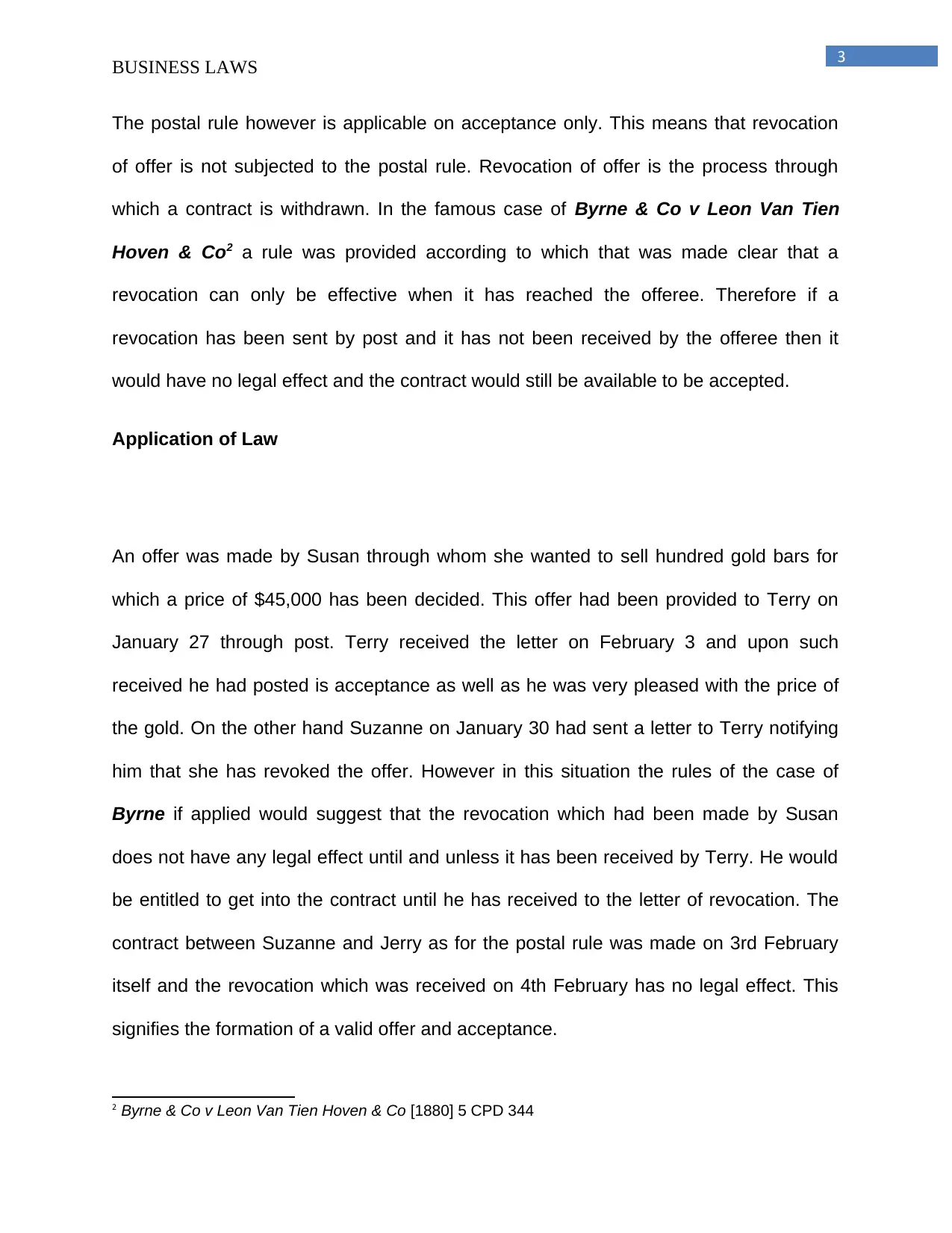
3
BUSINESS LAWS
The postal rule however is applicable on acceptance only. This means that revocation
of offer is not subjected to the postal rule. Revocation of offer is the process through
which a contract is withdrawn. In the famous case of Byrne & Co v Leon Van Tien
Hoven & Co2 a rule was provided according to which that was made clear that a
revocation can only be effective when it has reached the offeree. Therefore if a
revocation has been sent by post and it has not been received by the offeree then it
would have no legal effect and the contract would still be available to be accepted.
Application of Law
An offer was made by Susan through whom she wanted to sell hundred gold bars for
which a price of $45,000 has been decided. This offer had been provided to Terry on
January 27 through post. Terry received the letter on February 3 and upon such
received he had posted is acceptance as well as he was very pleased with the price of
the gold. On the other hand Suzanne on January 30 had sent a letter to Terry notifying
him that she has revoked the offer. However in this situation the rules of the case of
Byrne if applied would suggest that the revocation which had been made by Susan
does not have any legal effect until and unless it has been received by Terry. He would
be entitled to get into the contract until he has received to the letter of revocation. The
contract between Suzanne and Jerry as for the postal rule was made on 3rd February
itself and the revocation which was received on 4th February has no legal effect. This
signifies the formation of a valid offer and acceptance.
2 Byrne & Co v Leon Van Tien Hoven & Co [1880] 5 CPD 344
BUSINESS LAWS
The postal rule however is applicable on acceptance only. This means that revocation
of offer is not subjected to the postal rule. Revocation of offer is the process through
which a contract is withdrawn. In the famous case of Byrne & Co v Leon Van Tien
Hoven & Co2 a rule was provided according to which that was made clear that a
revocation can only be effective when it has reached the offeree. Therefore if a
revocation has been sent by post and it has not been received by the offeree then it
would have no legal effect and the contract would still be available to be accepted.
Application of Law
An offer was made by Susan through whom she wanted to sell hundred gold bars for
which a price of $45,000 has been decided. This offer had been provided to Terry on
January 27 through post. Terry received the letter on February 3 and upon such
received he had posted is acceptance as well as he was very pleased with the price of
the gold. On the other hand Suzanne on January 30 had sent a letter to Terry notifying
him that she has revoked the offer. However in this situation the rules of the case of
Byrne if applied would suggest that the revocation which had been made by Susan
does not have any legal effect until and unless it has been received by Terry. He would
be entitled to get into the contract until he has received to the letter of revocation. The
contract between Suzanne and Jerry as for the postal rule was made on 3rd February
itself and the revocation which was received on 4th February has no legal effect. This
signifies the formation of a valid offer and acceptance.
2 Byrne & Co v Leon Van Tien Hoven & Co [1880] 5 CPD 344
Paraphrase This Document
Need a fresh take? Get an instant paraphrase of this document with our AI Paraphraser
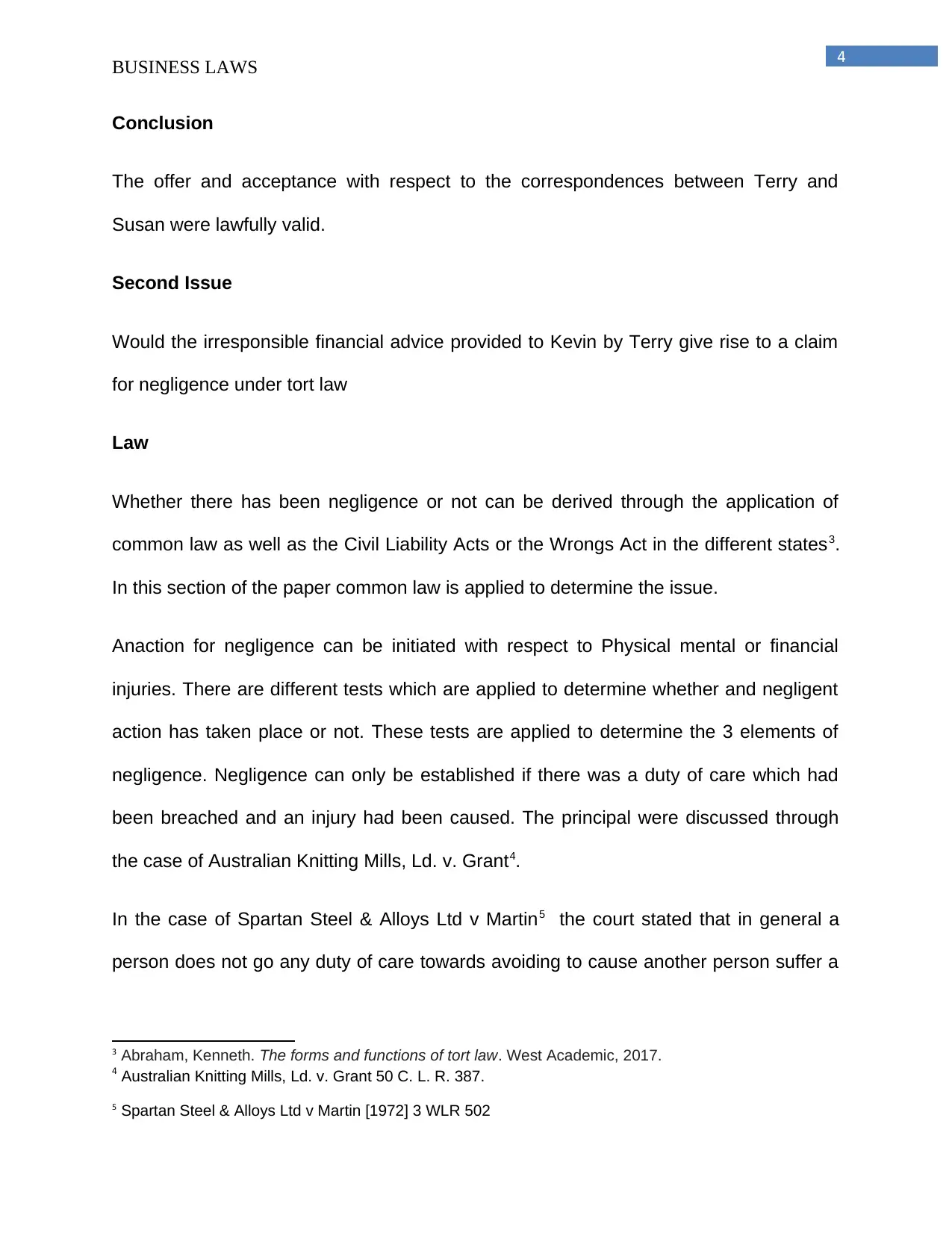
4
BUSINESS LAWS
Conclusion
The offer and acceptance with respect to the correspondences between Terry and
Susan were lawfully valid.
Second Issue
Would the irresponsible financial advice provided to Kevin by Terry give rise to a claim
for negligence under tort law
Law
Whether there has been negligence or not can be derived through the application of
common law as well as the Civil Liability Acts or the Wrongs Act in the different states3.
In this section of the paper common law is applied to determine the issue.
Anaction for negligence can be initiated with respect to Physical mental or financial
injuries. There are different tests which are applied to determine whether and negligent
action has taken place or not. These tests are applied to determine the 3 elements of
negligence. Negligence can only be established if there was a duty of care which had
been breached and an injury had been caused. The principal were discussed through
the case of Australian Knitting Mills, Ld. v. Grant4.
In the case of Spartan Steel & Alloys Ltd v Martin5 the court stated that in general a
person does not go any duty of care towards avoiding to cause another person suffer a
3 Abraham, Kenneth. The forms and functions of tort law. West Academic, 2017.
4 Australian Knitting Mills, Ld. v. Grant 50 C. L. R. 387.
5 Spartan Steel & Alloys Ltd v Martin [1972] 3 WLR 502
BUSINESS LAWS
Conclusion
The offer and acceptance with respect to the correspondences between Terry and
Susan were lawfully valid.
Second Issue
Would the irresponsible financial advice provided to Kevin by Terry give rise to a claim
for negligence under tort law
Law
Whether there has been negligence or not can be derived through the application of
common law as well as the Civil Liability Acts or the Wrongs Act in the different states3.
In this section of the paper common law is applied to determine the issue.
Anaction for negligence can be initiated with respect to Physical mental or financial
injuries. There are different tests which are applied to determine whether and negligent
action has taken place or not. These tests are applied to determine the 3 elements of
negligence. Negligence can only be established if there was a duty of care which had
been breached and an injury had been caused. The principal were discussed through
the case of Australian Knitting Mills, Ld. v. Grant4.
In the case of Spartan Steel & Alloys Ltd v Martin5 the court stated that in general a
person does not go any duty of care towards avoiding to cause another person suffer a
3 Abraham, Kenneth. The forms and functions of tort law. West Academic, 2017.
4 Australian Knitting Mills, Ld. v. Grant 50 C. L. R. 387.
5 Spartan Steel & Alloys Ltd v Martin [1972] 3 WLR 502
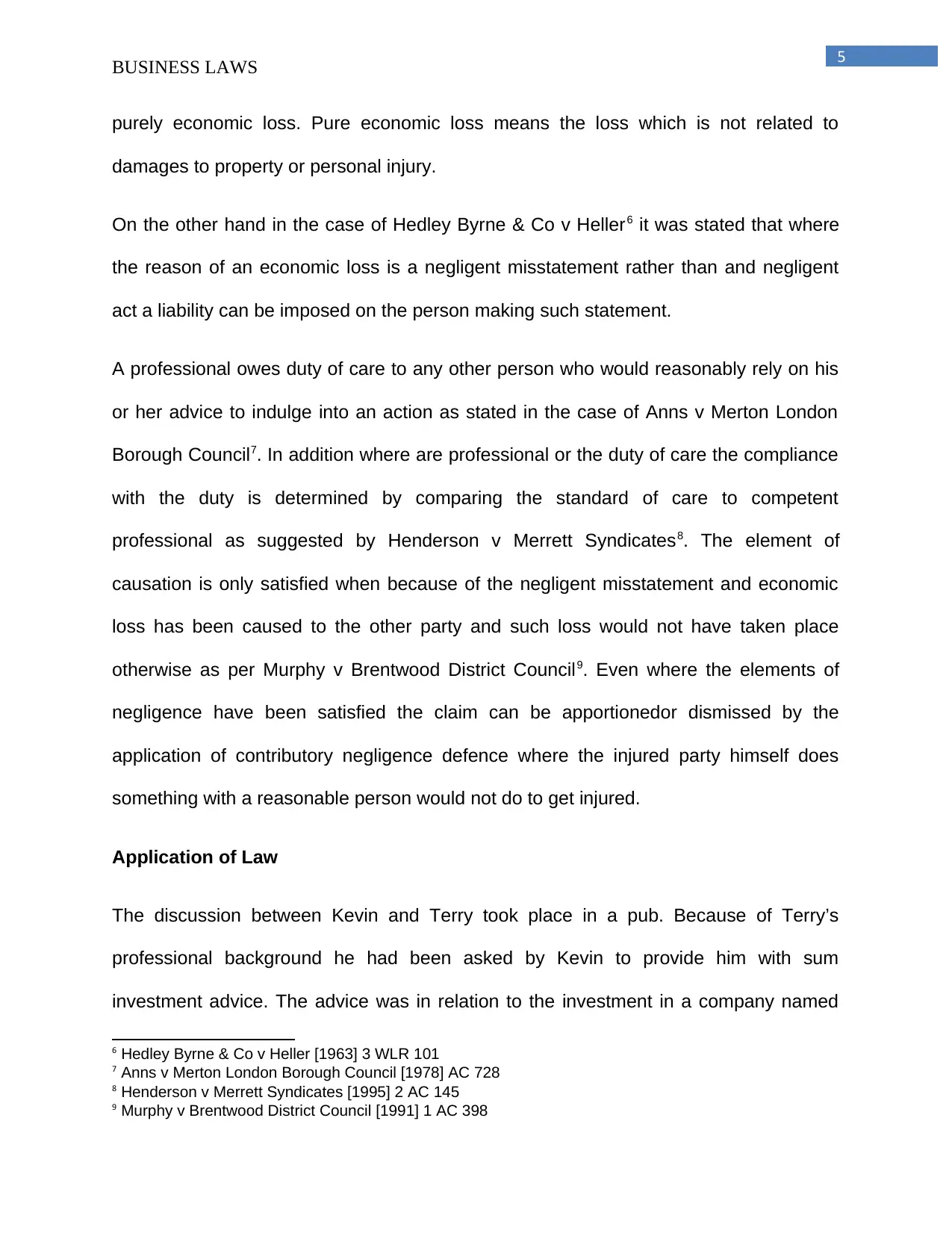
5
BUSINESS LAWS
purely economic loss. Pure economic loss means the loss which is not related to
damages to property or personal injury.
On the other hand in the case of Hedley Byrne & Co v Heller6 it was stated that where
the reason of an economic loss is a negligent misstatement rather than and negligent
act a liability can be imposed on the person making such statement.
A professional owes duty of care to any other person who would reasonably rely on his
or her advice to indulge into an action as stated in the case of Anns v Merton London
Borough Council7. In addition where are professional or the duty of care the compliance
with the duty is determined by comparing the standard of care to competent
professional as suggested by Henderson v Merrett Syndicates8. The element of
causation is only satisfied when because of the negligent misstatement and economic
loss has been caused to the other party and such loss would not have taken place
otherwise as per Murphy v Brentwood District Council9. Even where the elements of
negligence have been satisfied the claim can be apportionedor dismissed by the
application of contributory negligence defence where the injured party himself does
something with a reasonable person would not do to get injured.
Application of Law
The discussion between Kevin and Terry took place in a pub. Because of Terry’s
professional background he had been asked by Kevin to provide him with sum
investment advice. The advice was in relation to the investment in a company named
6 Hedley Byrne & Co v Heller [1963] 3 WLR 101
7 Anns v Merton London Borough Council [1978] AC 728
8 Henderson v Merrett Syndicates [1995] 2 AC 145
9 Murphy v Brentwood District Council [1991] 1 AC 398
BUSINESS LAWS
purely economic loss. Pure economic loss means the loss which is not related to
damages to property or personal injury.
On the other hand in the case of Hedley Byrne & Co v Heller6 it was stated that where
the reason of an economic loss is a negligent misstatement rather than and negligent
act a liability can be imposed on the person making such statement.
A professional owes duty of care to any other person who would reasonably rely on his
or her advice to indulge into an action as stated in the case of Anns v Merton London
Borough Council7. In addition where are professional or the duty of care the compliance
with the duty is determined by comparing the standard of care to competent
professional as suggested by Henderson v Merrett Syndicates8. The element of
causation is only satisfied when because of the negligent misstatement and economic
loss has been caused to the other party and such loss would not have taken place
otherwise as per Murphy v Brentwood District Council9. Even where the elements of
negligence have been satisfied the claim can be apportionedor dismissed by the
application of contributory negligence defence where the injured party himself does
something with a reasonable person would not do to get injured.
Application of Law
The discussion between Kevin and Terry took place in a pub. Because of Terry’s
professional background he had been asked by Kevin to provide him with sum
investment advice. The advice was in relation to the investment in a company named
6 Hedley Byrne & Co v Heller [1963] 3 WLR 101
7 Anns v Merton London Borough Council [1978] AC 728
8 Henderson v Merrett Syndicates [1995] 2 AC 145
9 Murphy v Brentwood District Council [1991] 1 AC 398
⊘ This is a preview!⊘
Do you want full access?
Subscribe today to unlock all pages.

Trusted by 1+ million students worldwide
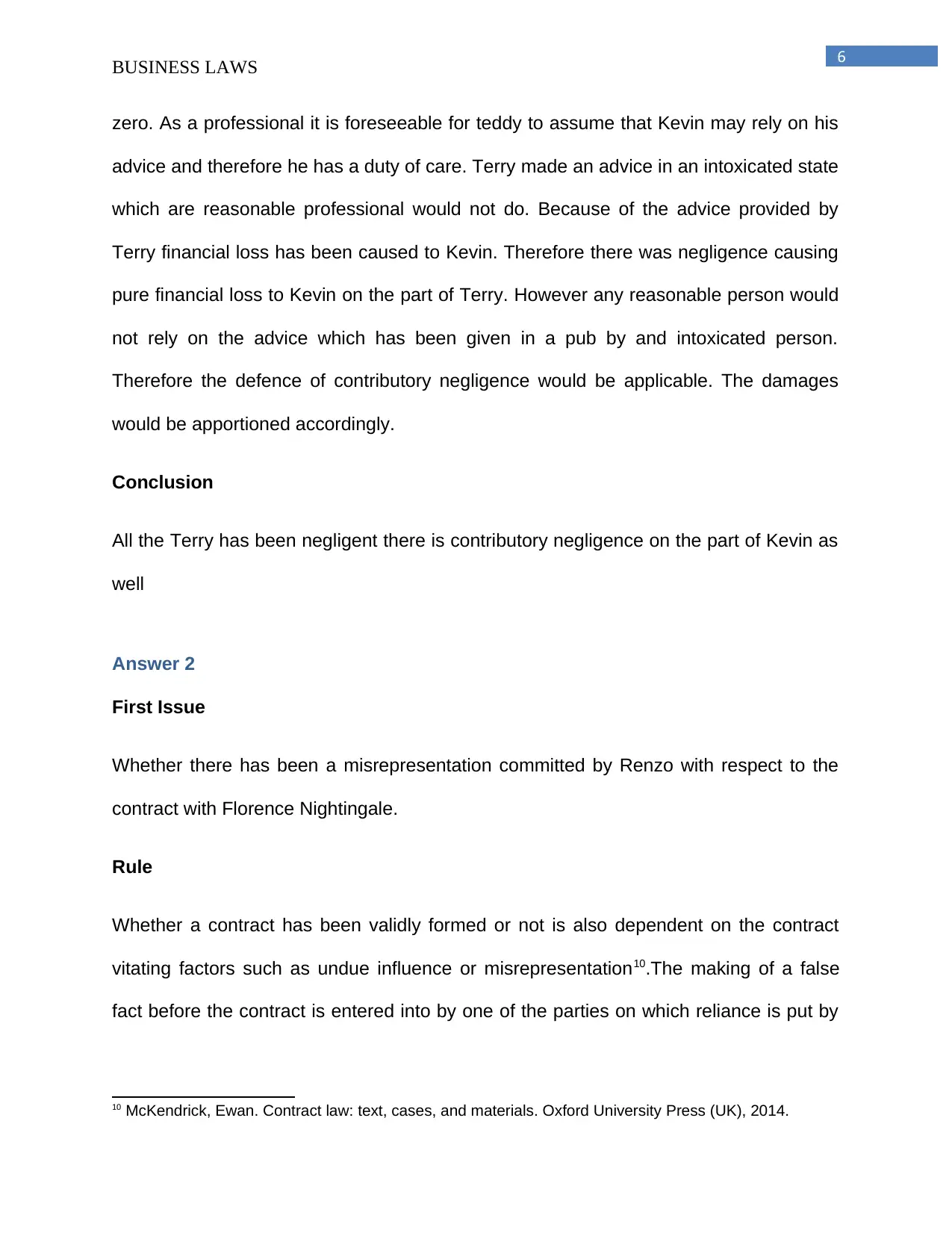
6
BUSINESS LAWS
zero. As a professional it is foreseeable for teddy to assume that Kevin may rely on his
advice and therefore he has a duty of care. Terry made an advice in an intoxicated state
which are reasonable professional would not do. Because of the advice provided by
Terry financial loss has been caused to Kevin. Therefore there was negligence causing
pure financial loss to Kevin on the part of Terry. However any reasonable person would
not rely on the advice which has been given in a pub by and intoxicated person.
Therefore the defence of contributory negligence would be applicable. The damages
would be apportioned accordingly.
Conclusion
All the Terry has been negligent there is contributory negligence on the part of Kevin as
well
Answer 2
First Issue
Whether there has been a misrepresentation committed by Renzo with respect to the
contract with Florence Nightingale.
Rule
Whether a contract has been validly formed or not is also dependent on the contract
vitating factors such as undue influence or misrepresentation10.The making of a false
fact before the contract is entered into by one of the parties on which reliance is put by
10 McKendrick, Ewan. Contract law: text, cases, and materials. Oxford University Press (UK), 2014.
BUSINESS LAWS
zero. As a professional it is foreseeable for teddy to assume that Kevin may rely on his
advice and therefore he has a duty of care. Terry made an advice in an intoxicated state
which are reasonable professional would not do. Because of the advice provided by
Terry financial loss has been caused to Kevin. Therefore there was negligence causing
pure financial loss to Kevin on the part of Terry. However any reasonable person would
not rely on the advice which has been given in a pub by and intoxicated person.
Therefore the defence of contributory negligence would be applicable. The damages
would be apportioned accordingly.
Conclusion
All the Terry has been negligent there is contributory negligence on the part of Kevin as
well
Answer 2
First Issue
Whether there has been a misrepresentation committed by Renzo with respect to the
contract with Florence Nightingale.
Rule
Whether a contract has been validly formed or not is also dependent on the contract
vitating factors such as undue influence or misrepresentation10.The making of a false
fact before the contract is entered into by one of the parties on which reliance is put by
10 McKendrick, Ewan. Contract law: text, cases, and materials. Oxford University Press (UK), 2014.
Paraphrase This Document
Need a fresh take? Get an instant paraphrase of this document with our AI Paraphraser
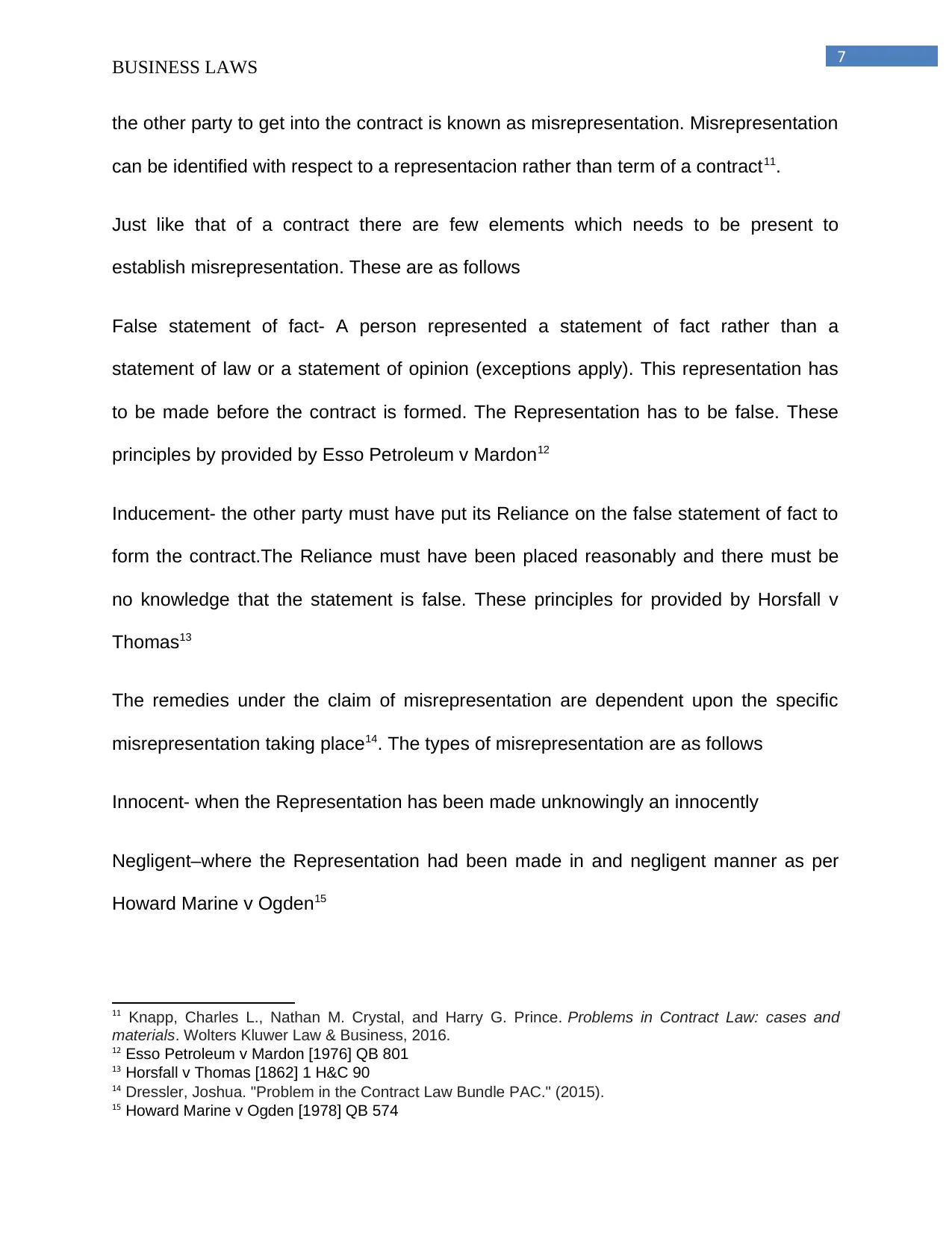
7
BUSINESS LAWS
the other party to get into the contract is known as misrepresentation. Misrepresentation
can be identified with respect to a representacion rather than term of a contract11.
Just like that of a contract there are few elements which needs to be present to
establish misrepresentation. These are as follows
False statement of fact- A person represented a statement of fact rather than a
statement of law or a statement of opinion (exceptions apply). This representation has
to be made before the contract is formed. The Representation has to be false. These
principles by provided by Esso Petroleum v Mardon12
Inducement- the other party must have put its Reliance on the false statement of fact to
form the contract.The Reliance must have been placed reasonably and there must be
no knowledge that the statement is false. These principles for provided by Horsfall v
Thomas13
The remedies under the claim of misrepresentation are dependent upon the specific
misrepresentation taking place14. The types of misrepresentation are as follows
Innocent- when the Representation has been made unknowingly an innocently
Negligent–where the Representation had been made in and negligent manner as per
Howard Marine v Ogden15
11 Knapp, Charles L., Nathan M. Crystal, and Harry G. Prince. Problems in Contract Law: cases and
materials. Wolters Kluwer Law & Business, 2016.
12 Esso Petroleum v Mardon [1976] QB 801
13 Horsfall v Thomas [1862] 1 H&C 90
14 Dressler, Joshua. "Problem in the Contract Law Bundle PAC." (2015).
15 Howard Marine v Ogden [1978] QB 574
BUSINESS LAWS
the other party to get into the contract is known as misrepresentation. Misrepresentation
can be identified with respect to a representacion rather than term of a contract11.
Just like that of a contract there are few elements which needs to be present to
establish misrepresentation. These are as follows
False statement of fact- A person represented a statement of fact rather than a
statement of law or a statement of opinion (exceptions apply). This representation has
to be made before the contract is formed. The Representation has to be false. These
principles by provided by Esso Petroleum v Mardon12
Inducement- the other party must have put its Reliance on the false statement of fact to
form the contract.The Reliance must have been placed reasonably and there must be
no knowledge that the statement is false. These principles for provided by Horsfall v
Thomas13
The remedies under the claim of misrepresentation are dependent upon the specific
misrepresentation taking place14. The types of misrepresentation are as follows
Innocent- when the Representation has been made unknowingly an innocently
Negligent–where the Representation had been made in and negligent manner as per
Howard Marine v Ogden15
11 Knapp, Charles L., Nathan M. Crystal, and Harry G. Prince. Problems in Contract Law: cases and
materials. Wolters Kluwer Law & Business, 2016.
12 Esso Petroleum v Mardon [1976] QB 801
13 Horsfall v Thomas [1862] 1 H&C 90
14 Dressler, Joshua. "Problem in the Contract Law Bundle PAC." (2015).
15 Howard Marine v Ogden [1978] QB 574
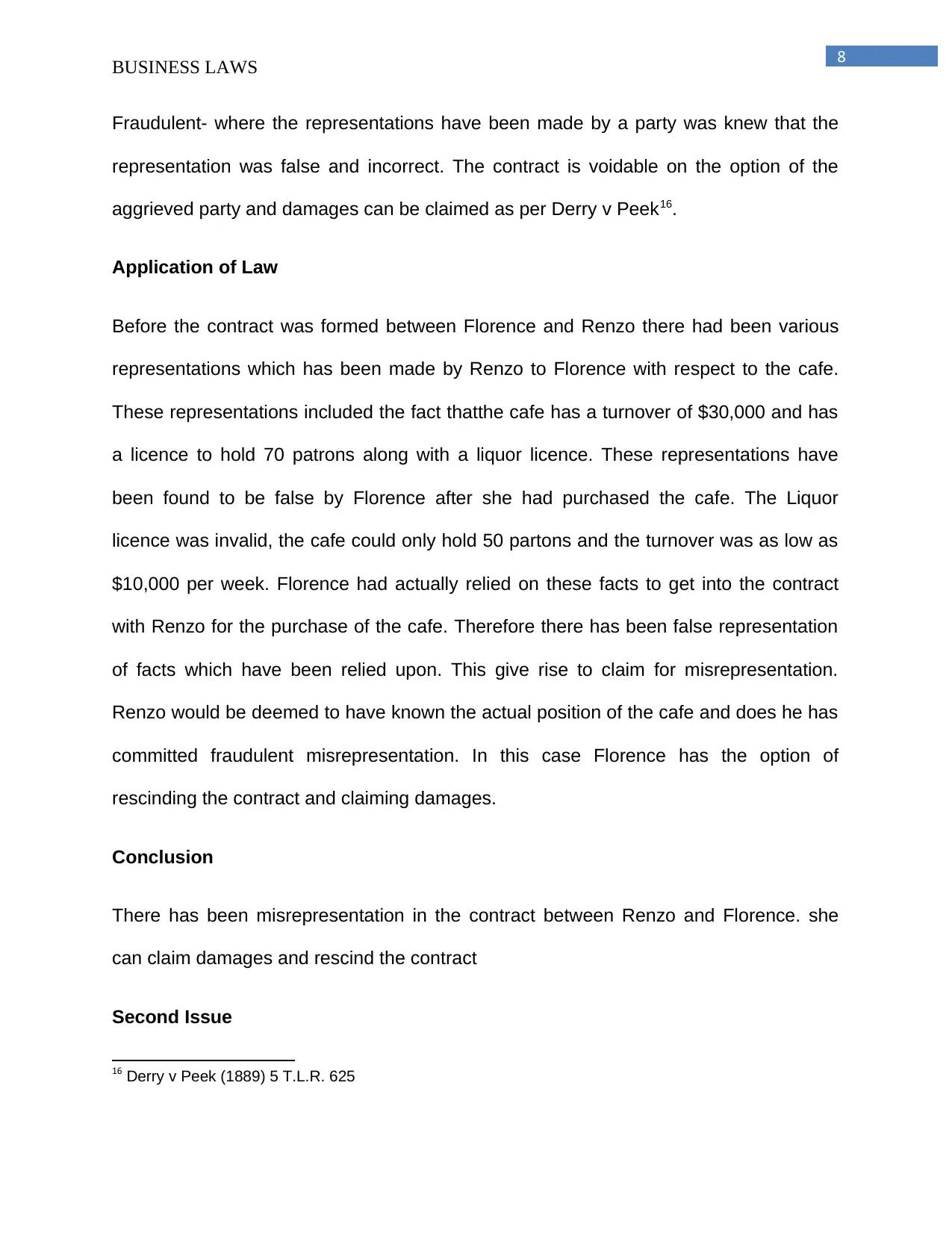
8
BUSINESS LAWS
Fraudulent- where the representations have been made by a party was knew that the
representation was false and incorrect. The contract is voidable on the option of the
aggrieved party and damages can be claimed as per Derry v Peek16.
Application of Law
Before the contract was formed between Florence and Renzo there had been various
representations which has been made by Renzo to Florence with respect to the cafe.
These representations included the fact thatthe cafe has a turnover of $30,000 and has
a licence to hold 70 patrons along with a liquor licence. These representations have
been found to be false by Florence after she had purchased the cafe. The Liquor
licence was invalid, the cafe could only hold 50 partons and the turnover was as low as
$10,000 per week. Florence had actually relied on these facts to get into the contract
with Renzo for the purchase of the cafe. Therefore there has been false representation
of facts which have been relied upon. This give rise to claim for misrepresentation.
Renzo would be deemed to have known the actual position of the cafe and does he has
committed fraudulent misrepresentation. In this case Florence has the option of
rescinding the contract and claiming damages.
Conclusion
There has been misrepresentation in the contract between Renzo and Florence. she
can claim damages and rescind the contract
Second Issue
16 Derry v Peek (1889) 5 T.L.R. 625
BUSINESS LAWS
Fraudulent- where the representations have been made by a party was knew that the
representation was false and incorrect. The contract is voidable on the option of the
aggrieved party and damages can be claimed as per Derry v Peek16.
Application of Law
Before the contract was formed between Florence and Renzo there had been various
representations which has been made by Renzo to Florence with respect to the cafe.
These representations included the fact thatthe cafe has a turnover of $30,000 and has
a licence to hold 70 patrons along with a liquor licence. These representations have
been found to be false by Florence after she had purchased the cafe. The Liquor
licence was invalid, the cafe could only hold 50 partons and the turnover was as low as
$10,000 per week. Florence had actually relied on these facts to get into the contract
with Renzo for the purchase of the cafe. Therefore there has been false representation
of facts which have been relied upon. This give rise to claim for misrepresentation.
Renzo would be deemed to have known the actual position of the cafe and does he has
committed fraudulent misrepresentation. In this case Florence has the option of
rescinding the contract and claiming damages.
Conclusion
There has been misrepresentation in the contract between Renzo and Florence. she
can claim damages and rescind the contract
Second Issue
16 Derry v Peek (1889) 5 T.L.R. 625
⊘ This is a preview!⊘
Do you want full access?
Subscribe today to unlock all pages.

Trusted by 1+ million students worldwide
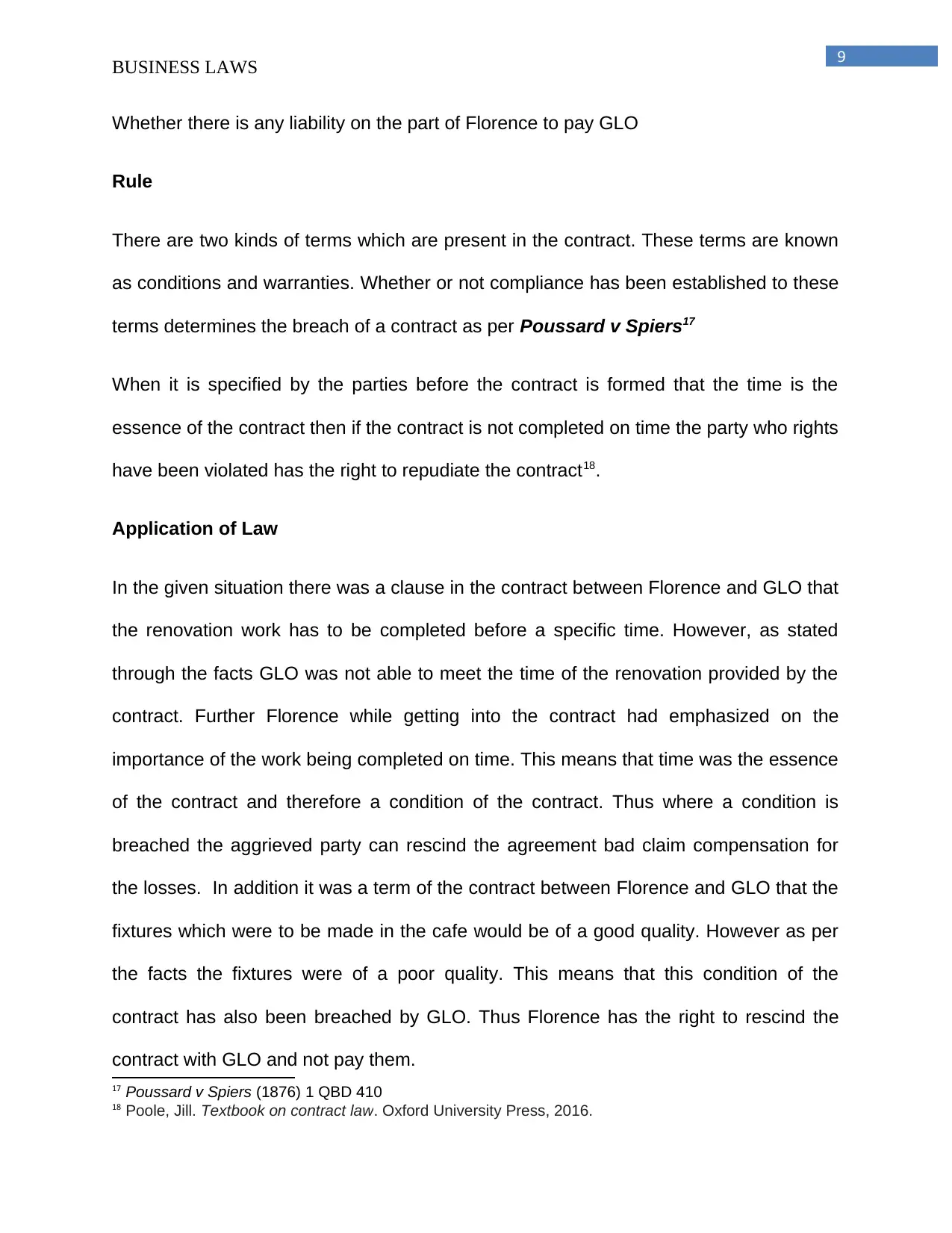
9
BUSINESS LAWS
Whether there is any liability on the part of Florence to pay GLO
Rule
There are two kinds of terms which are present in the contract. These terms are known
as conditions and warranties. Whether or not compliance has been established to these
terms determines the breach of a contract as per Poussard v Spiers17
When it is specified by the parties before the contract is formed that the time is the
essence of the contract then if the contract is not completed on time the party who rights
have been violated has the right to repudiate the contract18.
Application of Law
In the given situation there was a clause in the contract between Florence and GLO that
the renovation work has to be completed before a specific time. However, as stated
through the facts GLO was not able to meet the time of the renovation provided by the
contract. Further Florence while getting into the contract had emphasized on the
importance of the work being completed on time. This means that time was the essence
of the contract and therefore a condition of the contract. Thus where a condition is
breached the aggrieved party can rescind the agreement bad claim compensation for
the losses. In addition it was a term of the contract between Florence and GLO that the
fixtures which were to be made in the cafe would be of a good quality. However as per
the facts the fixtures were of a poor quality. This means that this condition of the
contract has also been breached by GLO. Thus Florence has the right to rescind the
contract with GLO and not pay them.
17 Poussard v Spiers (1876) 1 QBD 410
18 Poole, Jill. Textbook on contract law. Oxford University Press, 2016.
BUSINESS LAWS
Whether there is any liability on the part of Florence to pay GLO
Rule
There are two kinds of terms which are present in the contract. These terms are known
as conditions and warranties. Whether or not compliance has been established to these
terms determines the breach of a contract as per Poussard v Spiers17
When it is specified by the parties before the contract is formed that the time is the
essence of the contract then if the contract is not completed on time the party who rights
have been violated has the right to repudiate the contract18.
Application of Law
In the given situation there was a clause in the contract between Florence and GLO that
the renovation work has to be completed before a specific time. However, as stated
through the facts GLO was not able to meet the time of the renovation provided by the
contract. Further Florence while getting into the contract had emphasized on the
importance of the work being completed on time. This means that time was the essence
of the contract and therefore a condition of the contract. Thus where a condition is
breached the aggrieved party can rescind the agreement bad claim compensation for
the losses. In addition it was a term of the contract between Florence and GLO that the
fixtures which were to be made in the cafe would be of a good quality. However as per
the facts the fixtures were of a poor quality. This means that this condition of the
contract has also been breached by GLO. Thus Florence has the right to rescind the
contract with GLO and not pay them.
17 Poussard v Spiers (1876) 1 QBD 410
18 Poole, Jill. Textbook on contract law. Oxford University Press, 2016.
Paraphrase This Document
Need a fresh take? Get an instant paraphrase of this document with our AI Paraphraser
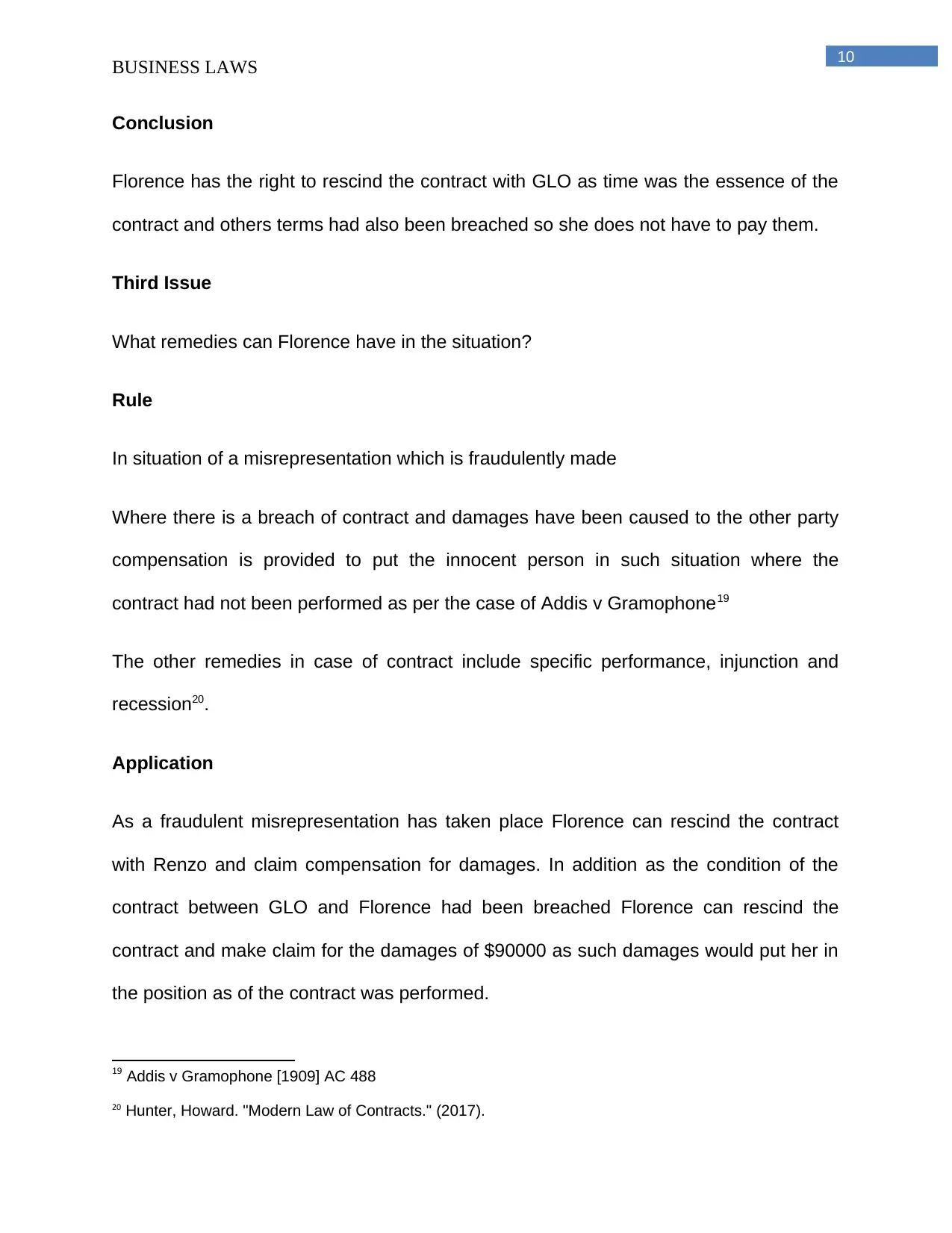
10
BUSINESS LAWS
Conclusion
Florence has the right to rescind the contract with GLO as time was the essence of the
contract and others terms had also been breached so she does not have to pay them.
Third Issue
What remedies can Florence have in the situation?
Rule
In situation of a misrepresentation which is fraudulently made
Where there is a breach of contract and damages have been caused to the other party
compensation is provided to put the innocent person in such situation where the
contract had not been performed as per the case of Addis v Gramophone19
The other remedies in case of contract include specific performance, injunction and
recession20.
Application
As a fraudulent misrepresentation has taken place Florence can rescind the contract
with Renzo and claim compensation for damages. In addition as the condition of the
contract between GLO and Florence had been breached Florence can rescind the
contract and make claim for the damages of $90000 as such damages would put her in
the position as of the contract was performed.
19 Addis v Gramophone [1909] AC 488
20 Hunter, Howard. "Modern Law of Contracts." (2017).
BUSINESS LAWS
Conclusion
Florence has the right to rescind the contract with GLO as time was the essence of the
contract and others terms had also been breached so she does not have to pay them.
Third Issue
What remedies can Florence have in the situation?
Rule
In situation of a misrepresentation which is fraudulently made
Where there is a breach of contract and damages have been caused to the other party
compensation is provided to put the innocent person in such situation where the
contract had not been performed as per the case of Addis v Gramophone19
The other remedies in case of contract include specific performance, injunction and
recession20.
Application
As a fraudulent misrepresentation has taken place Florence can rescind the contract
with Renzo and claim compensation for damages. In addition as the condition of the
contract between GLO and Florence had been breached Florence can rescind the
contract and make claim for the damages of $90000 as such damages would put her in
the position as of the contract was performed.
19 Addis v Gramophone [1909] AC 488
20 Hunter, Howard. "Modern Law of Contracts." (2017).
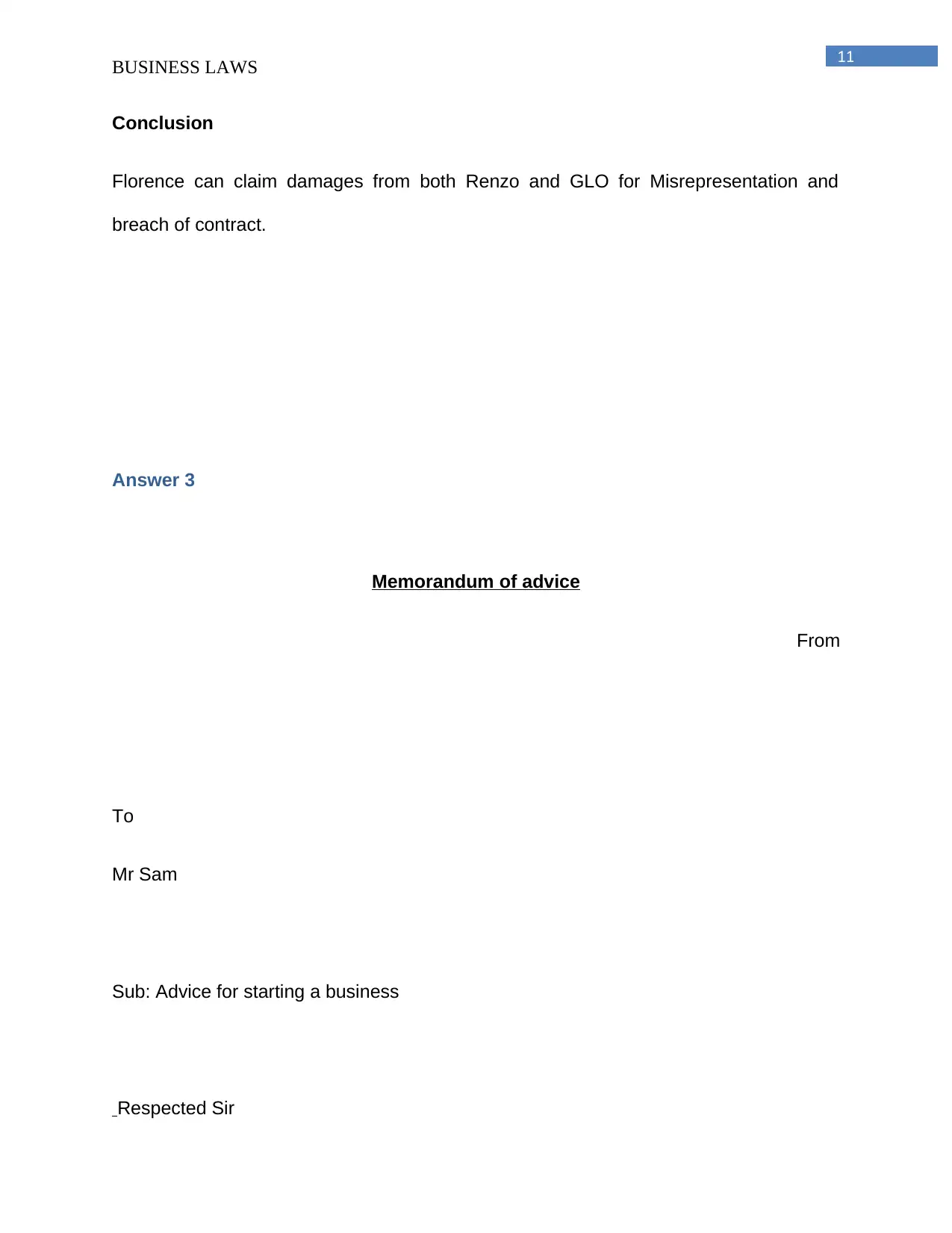
11
BUSINESS LAWS
Conclusion
Florence can claim damages from both Renzo and GLO for Misrepresentation and
breach of contract.
Answer 3
Memorandum of advice
From
To
Mr Sam
Sub: Advice for starting a business
Respected Sir
BUSINESS LAWS
Conclusion
Florence can claim damages from both Renzo and GLO for Misrepresentation and
breach of contract.
Answer 3
Memorandum of advice
From
To
Mr Sam
Sub: Advice for starting a business
Respected Sir
⊘ This is a preview!⊘
Do you want full access?
Subscribe today to unlock all pages.

Trusted by 1+ million students worldwide
1 out of 18
Related Documents
Your All-in-One AI-Powered Toolkit for Academic Success.
+13062052269
info@desklib.com
Available 24*7 on WhatsApp / Email
![[object Object]](/_next/static/media/star-bottom.7253800d.svg)
Unlock your academic potential
Copyright © 2020–2026 A2Z Services. All Rights Reserved. Developed and managed by ZUCOL.





